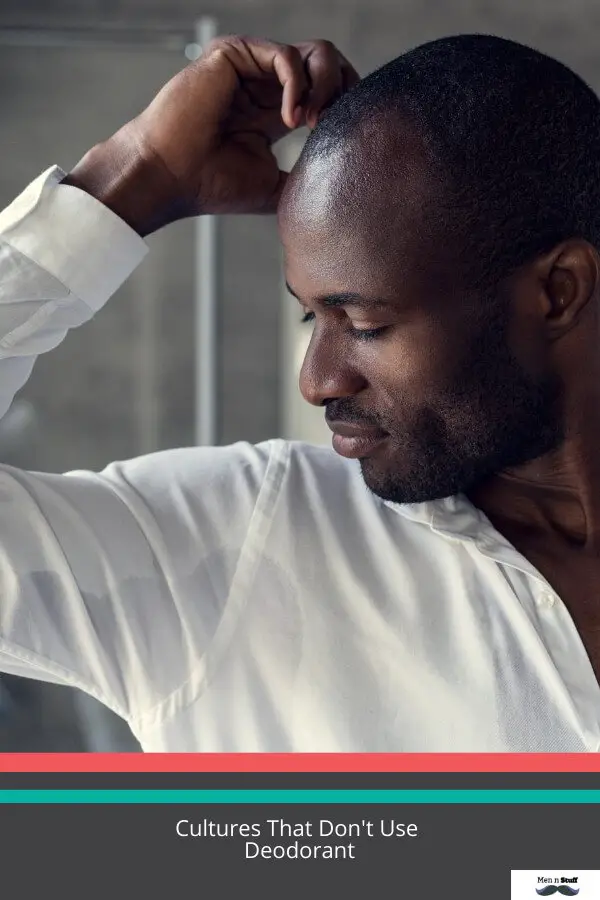Many cultures worldwide don’t commonly use deodorants. Inuit communities, for instance, have naturally low body odor due to their diet. In Japan, only 5% of the population regularly uses deodorant. These cultural variations highlight diverse approaches to personal hygiene.

Usage Of Deodorants By Different Cultures
1. North America
In North America, deodorants and antiperspirants are heavily used on a daily basis by both men and women. They are viewed as a necessity in maintaining personal hygiene. Many Americans opt for strong antiperspirants that inhibit the perspiration process entirely.
2. Europe
Most Europeans prefer deodorants over antiperspirants, focusing mainly on odor control rather than preventing sweat. Usage varies by country with Italians placing a higher value on natural scents and French focusing more on fragrance layering in their personal hygiene routine.
3. Middle East
In the Middle East, the usage of deodorants remains comparatively lower. The emphasis is placed upon frequent showering and use of traditional natural products like musk, amber and oud for combating body odor, rather than synthetic products.
4. Japan
Many Japanese people lack the gene that causes body odor, hence, the use of deodorants in Japan is relatively low compared to Western cultures. However, they do focus on personal hygiene and cleanliness, predominantly using mild or non-scented soap.
5. Africa
The use of deodorants varies greatly across Africa. In some urban areas, people prefer using deodorants frequently. However, in rural areas, traditional methods such as bathing with herbs and specific plants to combat body odor are prevalent.
6. India
In India, deodorant use has historically been low, but this is changing as Western consumer habits influence the middle class. Traditional Indian methods of maintaining personal hygiene include the use of aromatic herbs like Neem.
7. South America
In South America, deodorants play a significant role in personal hygiene. While countries like Argentina and Brazil have high usage, others such as Peru and Bolivia lean towards natural antiperspirants like baking soda.
Understanding the cultural differences in deodorant utilization highlights the diversity of personal hygiene practices around the globe. It’s important to understand that norms for personal hygiene vary greatly from place to place. Just as our taste in food is culturally defined, so are our practices when it comes to combating body odor.
| Culture | Usage of Deodorants |
|---|---|
| North America | High usage of antiperspirants |
| Europe | Prefer deodorants over antiperspirants |
| Middle East | Low usage; prefer natural scents |
| Japan | Low usage due to genetic factors |
| Africa | Varies greatly, traditional methods common |
| India | Growing usage, use of aromatic herbs |
| South America | High usage in urban areas, varies in rural |
Cultures That Don’t Use Deodorant
1. The Japanese Culture
Despite their spotless and organized nature, many Japanese people tend not to use deodorants. This is due to their genetic makeup. A significant proportion of Japanese individuals carry a gene variant that eliminates body odor. They lack the protein responsible for producing sweat that bacteria can break down, cause body odor.
2. The Chinese Culture
Similar to the Japanese, a big fraction of the Chinese population bear a genetic mutation that leads to minimal body odor, eradicating the need for regular use of deodorants. Hence, deodorants are not a hot commodity in the Chinese market.
3. Korean Culture
Koreans are known for their meticulous skincare routines, but not so much for their use of deodorants. A majority of the population lack the ABCC11 gene, responsible for causing body odor. Therefore, a market for deodorants hardly exists in the Korean society.
4. The Indian Culture
In Indian culture, it’s more common to use natural alternatives such as sandalwood paste or herbal powders instead of commercial deodorants. These natural methods align better with traditional Indian practices and Ayurvedic philosophies.
5. The Australian Aboriginal Culture
The indigenous culture of Australia often tend towards using traditional methods of controlling body odor too. This can include burning aromatic leaves or herbs and using the smoke to “wash” their bodies. It’s a practice that goes hand in-hand with cultural beliefs and spirituality.
| Culture | Use of Deodorant |
|---|---|
| Japanese | Limited due to genetic makeup |
| Chinese | Minimal due to similar genetic mutation |
| Korean | Rare due to the lack of body odor gene |
| Indian | Opt for natural alternatives, such as herbal powders |
| Australian Aboriginal | Use traditional methods like aromatic smoke “baths” |
It’s worth noting that the use of deodorants or lack thereof is not necessarily a reflection of cleanliness or personal hygiene standards, but often a matter of genetics and cultural norms. Beyond this list, there exist many other cultures that may not utilise commercial deodorants, rather preferring natural methods or not needing it due to specific genetic predispositions.
Usage Of Deodorants By Western Cultures
The people of Western culture considered smell as the most undervalued among the senses. Thus, the scientists of the 18th and 19th centuries initiated a movement termed Revaluation of the Senses. As per academic research, people consider smell as inferior to other senses like vision and hearing.
That is why they used the colloquial term for the nose, which is usually respected. No representations exist in Western culture to explain the smelling ability, whereas ample terms are available to mention the hearing, visual, and feeling abilities.
There are fewer old factory terminologies that exist in a Western language. Also, there is no particular term to distinguish the perceptions of odors. Usually, the word smell connotes the negative meaning of lousy odor, which predominantly people think about the foul odor when they hear the word smell.
Usage Of Deodorants By Other Cultures
Apart from Western culture, people from other cultures considered smell as the emperor of all senses. People of Ongee culture from the Andaman Islands feel that fragrance defines the universe. Moreover, their calendars are constructed based on the smell of the flowers.
‘Konyune on orange-tanka?’, this is the term which was used by Ongee people to greet someone, which means How is your nose? Likewise, Serer Ndut of Senegal and Bororo of Brazil also associate the smell with personal identity. People from Bororo of Brazil associate body odor with the life force and breath odor with the soul. To a greater extent, the Ndut can predict the child’s hereditary by the child’s smell.
Smell Preferences Of Different Cultures:
| Regions | Smell Preferences |
| Western culture | Sweet-scented perfumes |
| Dassanetch of Ethiopia | Saffron, Musk, Rose |
| Dogon of Mali | Smell of onions |
| Arabs | Saffron, Musks, Rose |
| African Bushmen | Smell of rain |
Smell Rituals Related To Usage Of Perfume
Some of countries follow certain rituals in applying perfume. These rituals related to perfume include:
1. In Arab countries, people use fragrance at the end of every social meal. After removing the food tray at the end of tea time, the host will bring the perfume box for people to apply to their bodies or outfits. The appearance of the perfume box indicates the meeting has officially come to an end.
2. Gifting perfume is considered an honor, which is regarded as a respectful way of welcoming people to the meeting.
3. Tzotzil people of Mexico offer incense and fragrance candles to the deities.
4. The Dakota of Western Plains smokes the scented grasses to worship gods.
5. In Hindu temples, people burn sandalwood to possess a divine connection with God.
6. Chewing of the Malay Peninsula treats sweet smell as a sign of good spirits, and pungent or lousy odor is associated with evil spirits.
7. In Colombian Desana, the shaman blows the smoke of sweetly scented tobacco cigars over a girl once she attains puberty. It is performed to recognize her as a member of the civilized adult community.
8. In North Sudan, during the wedding ceremony, the bride and the groom are ritually scented with a blend of cold, masculine fragrance and hot feminine fragrance to ensure nuptial unity and rich fertility.
Views Of Different Cultures On Scent
For instance, the traditional form of greeting, western hugs or kisses in India, is by smelling a person’s head. A famous quote from an Ancient Indian text, “I will smell thee on the head,” is the most generous sign of tender love that tells us about the significance of the smell of Indian people.
Likewise, in Arab countries, breathing the person’s scent while conversing with others denotes friendship and harmony. People of Amazonian Desana have similar body smells, so people with distinctive odors get married in their tribe.
A similar tradition was followed by the Batek Negrito of the Malay Peninsula which restricts sexual intercourse between people with similar aromas. They forbid people of similar odors from sitting close to each other.
Scent Preferences Of Different Cultures
For the people of Dassanetch of Ethiopia, the cows’ odor is a more pleasing smell than anything else. The scent is associated with fertility and social status, so men usually rinse their hands with cattle urine and smudge their bodies with manure. At the same time, the women apply the butter in their body to smell good and attractive.
In contrast, the Dogon of Mali considers the scent of onion as a more lovely fragrance, so they smear the fried onions all over the body to have an attractive smell.
Scent Preferences Of Arab Nations
People of Arab nations use a wide variety of scents with a distinctive sweet smell. They rub the fragrance of musk, saffron, and rose in their body to feel fresh. They use different fragrances to apply to other parts of the body.
For instance, they use Ambergris, jasmine, and sesame or walnut oil for hairs. Mkhammariyah, a blend of Rose, Saffron, Civet, Musk, and aloe wood, are used to apply on the ears. They scent neck with Narcissus and Ambergris, and sandalwood in armpits.
They apply perfume only when they have private meetings. In public, they avoid perfumes as it is considered to be an act of adultery. The African Bushmen believe the smell of rain is the most divine fragrance in their community.
Personal Odor
In most Western countries, people are unaware of their body odor as they use sweet-scented perfumes as soon as they return from the bath. They only prefer smelling good to get rid of the sweat odor. But the members of Amazonian Desana describe the person according to their natural fragrance.
They discriminate against people with a person’s natural aroma. At the same time, the Westerners are unaware of it. Oma Seriri, the term used by Desanas, is to discriminate against people with their natural body smell. They feel odors occur due to emotions and are also related to the person’s fertility, and it is scientifically accurate.
Among people of the Amazonian region, over 60,000 Avon women sell deodorants and perfumes. They do home to home services to increase their business. They also follow the barter system like two dozen eggs are given to buy a bottle of Simpson roll-on deodorant and 20 pounds of the flour for a bottle of charisma perfume.
FAQs
1. Can Applying A Perfume Elevate Your Social Status?
2. How To Choose A Perfect Fragrance?
3. Why People Apply Scent During The Social Gathering?
References:
https://www.trulysnaturaldeodorant.com/blogs/stay-healthy/cultural-deodorant-differences
https://www.quora.com/Is-not-wearing-deodorant-a-cultural-decision-or-a-personal-choice

